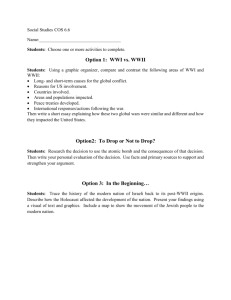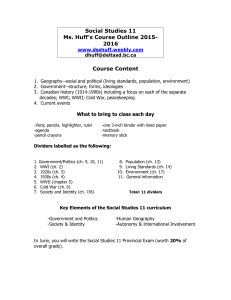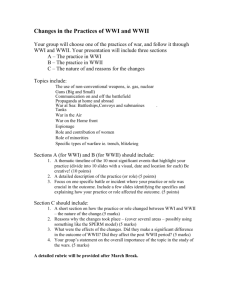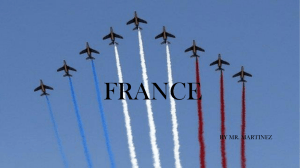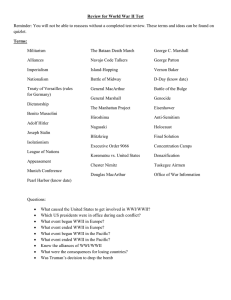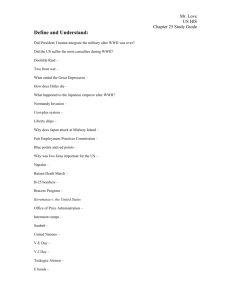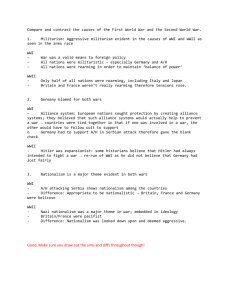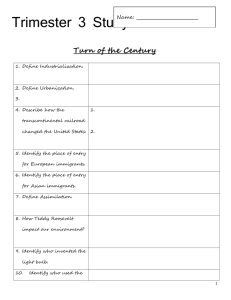Eastern Europe - Kenston Local Schools
advertisement
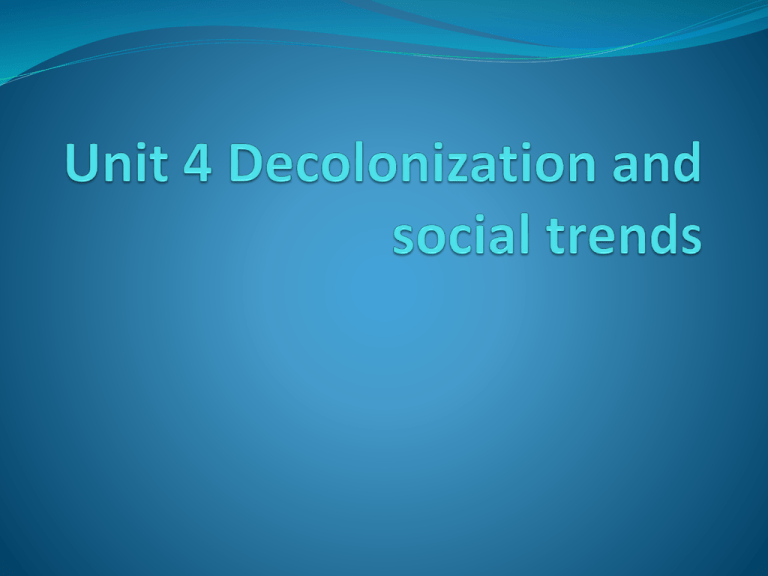
Decolonization Europe is done- can’t run empires anymore. Postwar era full of successful nationalist movements. 3 waves of democratization (Sam Huntington) 1. America and France, and gradual growth of democracy in England. Slow process- only 29 countries when wwi starts 2. Allied victory in wwi/wwii creates new countries in Europe, Asia and Africa from 1920-1960s 3. 1970s dictatorships in Europe begin to end, breakup of soviet bloc Why? Independence movements actually began before world wars, esp. in areas with strong independent cultures like Egypt and India. Also, wars created colonial industrialization (Europe had avoided that to keep them independent) which made them more ready. After wwii there was also a greater emphasis on human rights, including self determination for all peoples, not just Europeans- actions had shown them to be not quite a superior as they had painted themselves. Between 1947-62 virtually all colonies (who want it) gain independence. India During WWI England promised India if they supported war effort they would get home rule. Gov’t of India Act 1919 gave power over agriculture, education and local gov’t to Indians, but did not move far enough forward to satisfy nationalists. England waffled between treating them as a nation and a colony Indian National Congress had been established in the 1800s- born of western educated liberals who wanted an equal place Gandhi: Civil Disobedience Oxford educated Lawyer. (Began in S. Africa, returned to India during wwi) Transformed cause of independence from elite movement to mass movement. Sparked patriotic feeling, and a desire for Indian self sufficiency. Civil Disobedience: Refusal to follow unjust law. Non violent non cooperation- “truth force” Show others that they are wrong, without attack, and they will have no choice but to change Hindu/Muslim Split 1947 British India about 70% Hindu, 30% Muslim. Muhammad ali Jinnah (Muslim league) and Jawaharlal Nehru (Indian National Congress) disagreed about makeup of independent gov’t (Nehru also disagreed with Gandhi about industrializing India) As they are heading toward independence there is violent rioting over whom will control what area- which even Gandhi could not stop. England wants to focus on what is going on at home- sends Lord Mountbatten to divide India and supervise transition of independence. India, Pakistan, and East Pakistan (Bangladesh) created. More violence- 500,000 killed (Including Gandhi) Still border issues to this day (Kashmir) Southeast Asia Burma (Myanmar) becomes independent 1947, Ceylon (Sri Lanka) 1948, Malaysia 1963- all British. French were even less capable of holding colonies after the war, pulled out of Indochina (Vietnam) 1954 (Dien bien Phu) Laos and Cambodia, but left them without guidance- fell to strongman dictatorships Dutch decolonized Indonesia in 1949, US released Philippines in 1946 Sub Saharan Africa Like India, there were generally western educated Africans leading movements for democracy and nationalism Disillusioned by European claims of superiority after wwii, unhappy with the fact that africans worked and Europeans profited As new nations are created many colonial borders are kept, a problem because they don’t reflect ethnic makeups of region, will be a consistent source of conflict New Countries/Old Empires Britain and France created plans to provide independence and still maintain goodwill of new nations. Invested in infrastructure (hydroelectric power, agricultural technology) Increased educational facilities. Ghana- 1st to be N. Africa colonies a choice between independence (and being cut off) or Self gov’t with French protection (all choose this except Guinea and Djibouti) Belgium: Congo had the most violent transition, Belgians simply abandoned in 1959 leading to civil war. In Rwanda, Belgians had allowed the Tutsi minority (15%) to dominate the Hutu population, when they pulled out ethnic fighting began which continues to this day. South Africa After 1980 S. Africa was the only white ruled country on the continent. 1/5 population European, primarily Boers/Afrikaaners. (who took power in gov’t 1948 as British pulled back after wwii). Cultural Imperialism continued “Colored” S. Africans (Black and Indian) had no polticial rights, few educational or economic opportunities. African National Congress (ANC) formed 1913- didn’t get far 1948 Apartheid instituted: legal segregation of races, became national policy. Blacks forced to live in specific areas, carry passes etc…. Nelson Mandela Leader of ANC, sentenced to life imprisonment in 1964 for anti-apartheid protests UN began sanctions against South Africa for human rights violations- but S. Africa has some key resources, esp gold/diamonds, so it was tricky. Still, over time, pressure built. 1990 Mandela released from prison, 1994 became 1st Black president of S. Africa North Africa/Middle East Decolonialization didn’t happen all at once, many patterns and time frames (some after wwi, some wwii) One of the world’s oldest centers of civilization- so not without experience in ruling themselves, considerably less chaos However, ethnic tensions were becoming a factor. Muslims had been united in their dislike of mandate system. Now there are tensions building between Arab/Non Arab, Sunni/Shite etc… Balfour declaration 1917- British promised Arabs, and Zionists, an independent nation in Palestine in return for support during the wwi. Conflicting interests. Palestine As Israel was created 1948– UN divided the territory to created both a Palestinian and Jewish State. Palestinains (supported by Arabs) have vowed to fight until Israel destroyed. Virtually permanent conflict to this day Turkey Mustafa Kemal led Turkey to independence in 1923- set about creating a secular, nationalist state (which was controversial in Muslim world). Abolished Sharia (religious law), polygamy, and office of Caliph. Replaced Arabic with Latin alphabet. Neutral in wwii Caught between Europe and Middle east Ethnic issue- Kurds North Africa/Egypt During war Egypt Independent in 1922- but established a league of Arab states- a regional organization to support areas with Arab majorities In French territory Arabs united as National Liberation Fronttriggering fall of 4th Republic heavy British influence remained because of canal. 1956 Gen. Abdul Nassar nationalized the canalBritish and French threatened to fight, but US said back down Social and Cultural Trends By 1960s a new generation of Europeans had grown up in a post-war world (no memory of depression or totalitarianism, hazy memory of war) Spirit of activism, questioned cold war, address issues of equality (mirrors civil rights/anti-war movements in US) Events of May: 1968 student protest at the Sorbonne in Paris- ended up with 8 million people on strike. Represented the large # of people unhappy with conservative government of De Gaulle (called for new elections) Rise of the middle class Largely a result of increased access to higher ed. European society became more mobile and democratic- far less rigid than any period in their history. Needed large #of people with tech and management background. Welfare states created cushion for those in need Women’s Movement Most countries of Europe had given women suffrage after wwi (France and Italy after wwii, Switzerland not until 1980!) but equality didn’t quite follow. War saw wide scale women’s employment, which ended when the men came home. 1960s women’s movementemphasizing cultural, sexual, and economic rights beyond the vote. Repealed laws that prohibited contraception and abortion (even in RC countries) 70s saw beginning of rise in women working again- from 32% in 1970 to 44% in 1990 and increased educational opportunities allowed more professional positions Parallels Women’s movement in USmany of the same issues (example of how much more linked the cultures are in postwar world 50s and 60s typical to marry young and have kids quickly (though # of children per family declined to 2 per family) Opportunity to earn $$ at home (cottage industry) long gone- have to go out to work- so childcare became a part of the welfare state in many countries. Simone de Beauvoir- The Second Sex 1949 said that women were free…but trapped. Only by courageous action could they escape the role of “other” Consumerism Sparked by rising standard of living after the war and increased size of the middle class. Auto industry expanded dramatically (though not to size of US. “Gadget Revolution” More disposable incomewelfare state meant you needed to save far less for old age. Leisure and recreation became major industriespaid vacations required by law Counterculture There was a baby boom in Europe too (though families were not a large) and a distinct international youth culture. Raised in econ prosperity, and secure democracies, had a very different view of the world than their parents. Counterculture was a rebellion against status quo (both parents and authority figures in general) Rock music (Beatles/Stones), age of 1st sexual experience decreased signficantly (the “pill” intro 1960) Student Revolts Opposition to imperialistic conflicts (attempts to hold colonies) New Left Thinking popular @ universities (revival of original marxist theory) Rejection of materialism and belief that postwar society was morally flawed. For older generationspelled end of an era (make a better world and what do the kids do….) Religious Reform Europe significantly more secular after wwii, only 15% attend church regularly (varies by country) Second Vatican Council 1962most important doctrinal reform since Council of Trent in 1542 Use of Vernacular in Church services RC is still “One True Church” but other Christian groups were to be respected. Less severe dress for priests and nuns Trends in Philosophy, Literature, and Art Philosophy: Modernism came with I.R. Values include secularism, reasoning, materialism, technology and Freedom (rather than equality) Post Modernism: Postwar/postindustrialism. Emphasized quality of life over material gain. Importance of education (for knowledge not $$) healthcare and environmentalism. Jean Francois Lyotard: Argued that modern philosophy is based on accepted stories or what he called “metanarratives”. But because the world has changed those assumptions no longer make sense. People are developing not on absolute truths, but through changing relationships Existentialism Philosophy based on sense of anxiety and despair, first appeared after horrors of wwi, and wwii had plenty of horrors of its own Post war existentialists explore what it means to be human in a world without cultural moorings, clear guideposts, absolute standards. Albert Camus/Jean Paul Sartre: Said God was dead, we are alone in the universe without a pre-ordained destiny- so we have to make our own sense of the world to reshape life’s meaning. Literature Alexander Solzhenitsyn: (the Gulag Archipelago) brought USSR under fire with his descriptions of soviet labor camps Jacques Maritain: (Man and the State) advocated a return to faith and religious tradition- said there is comfort in belief TS Eliot: (The Wasteland, and a poet) advocated a focus on family and return to localism, the whole world is too big to worry about. Art As people emphasized post modern quality of life, works that elevated traditional craftsmanship, like weaving and furniture making, were recognized as art forms Abstract Expressionism Creation of works that make no attempt to create visual reality. Jackson Pollack- splatter paintings Also called action painting or Tachisme New York replaces Paris as the center of the art world.(many artists like Marc Chagall and Marcel du Champ leave Europe right after the war) Pop Art Made images of Pop culture into art. Andy Warhol – Campbell’s Soup Can. Roy Lichtenstein Challenged traditions for fine art by using everyday objects, mass culture (comic books and advertising) Rejection of abstract expressionism emphasizes the banal, stresses Irony
